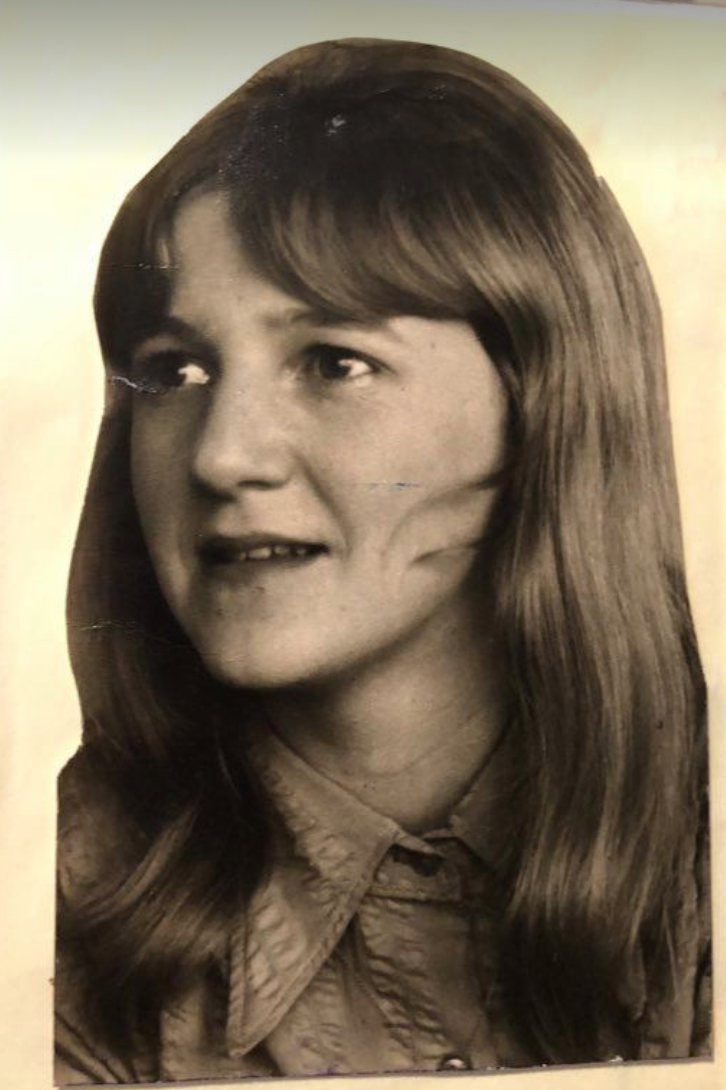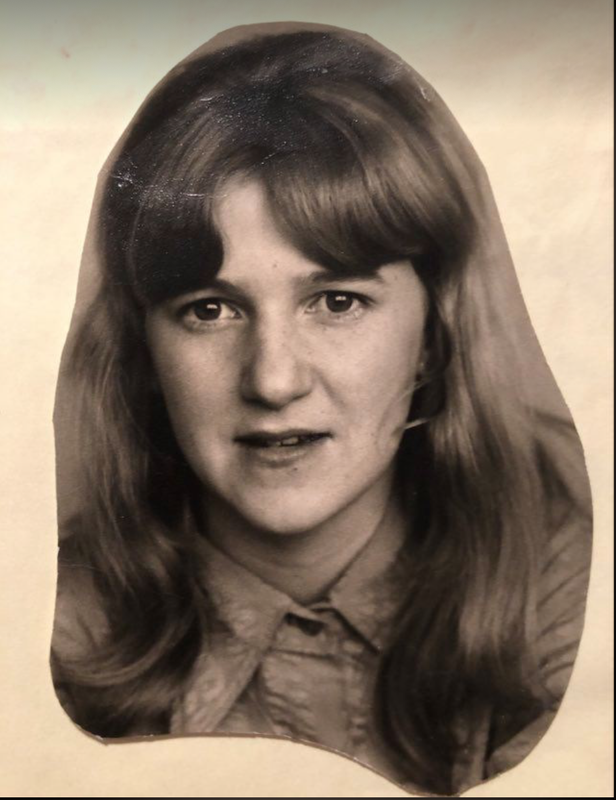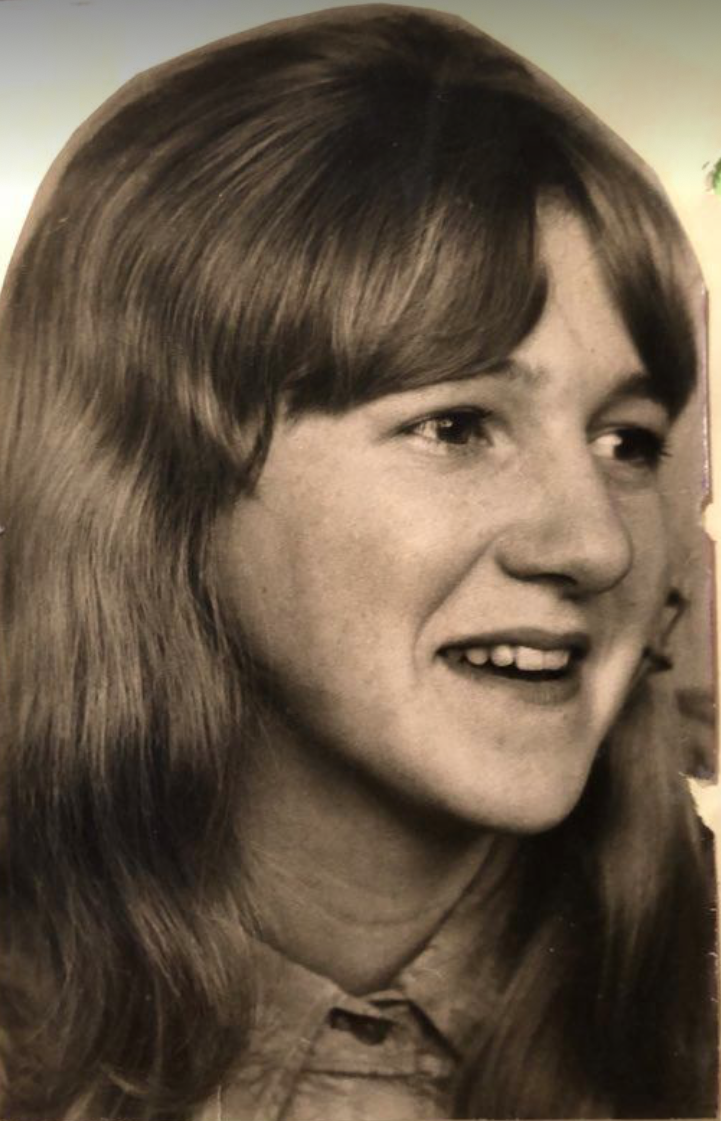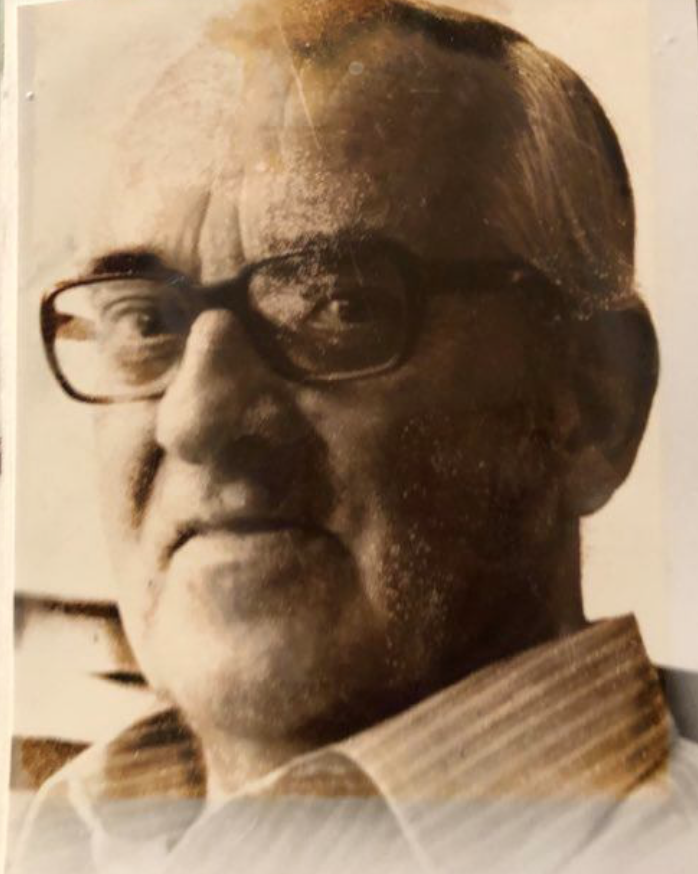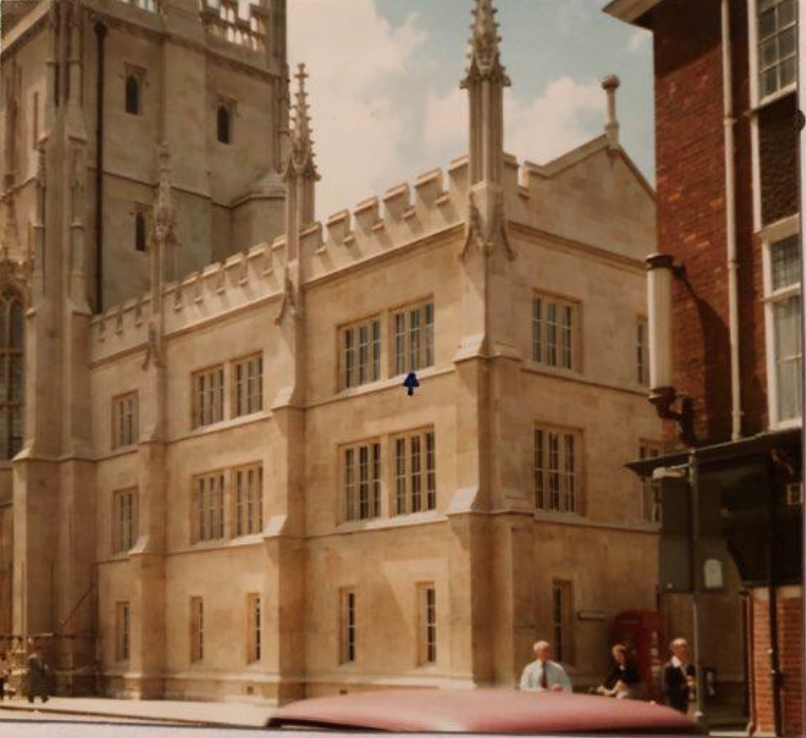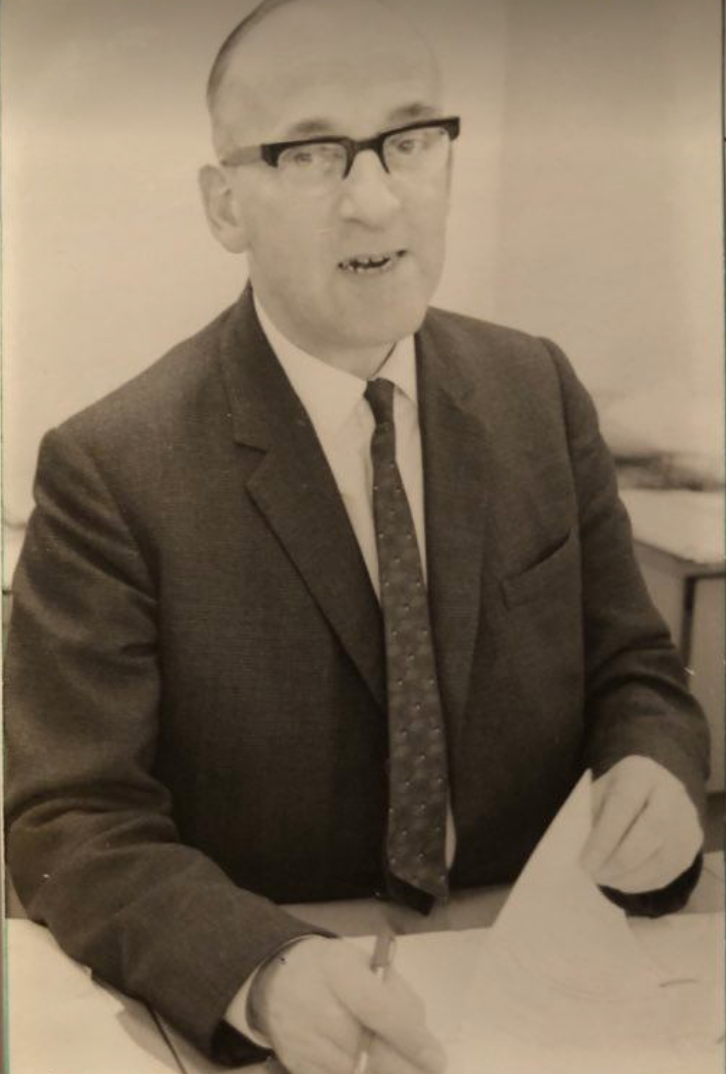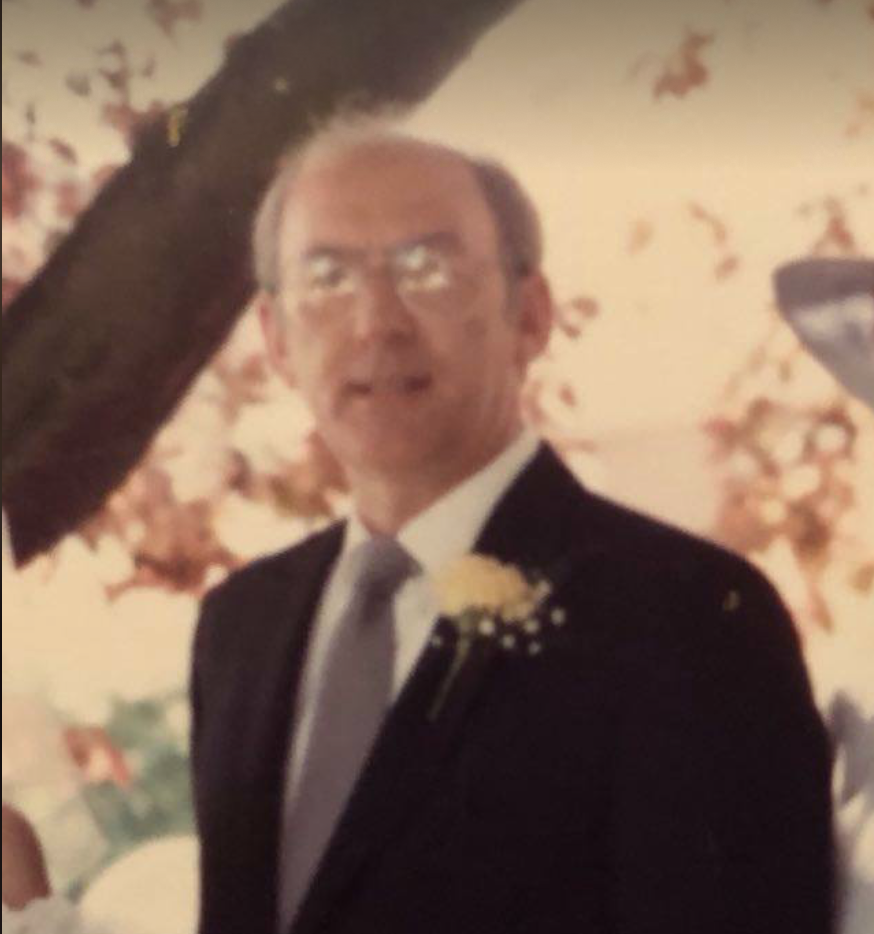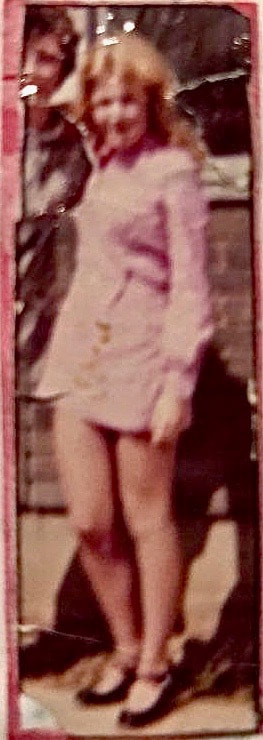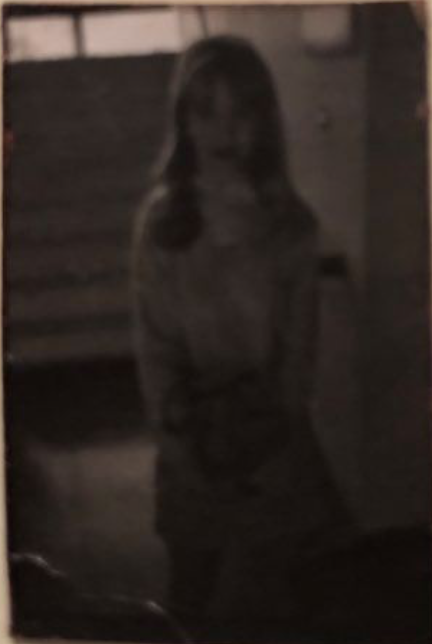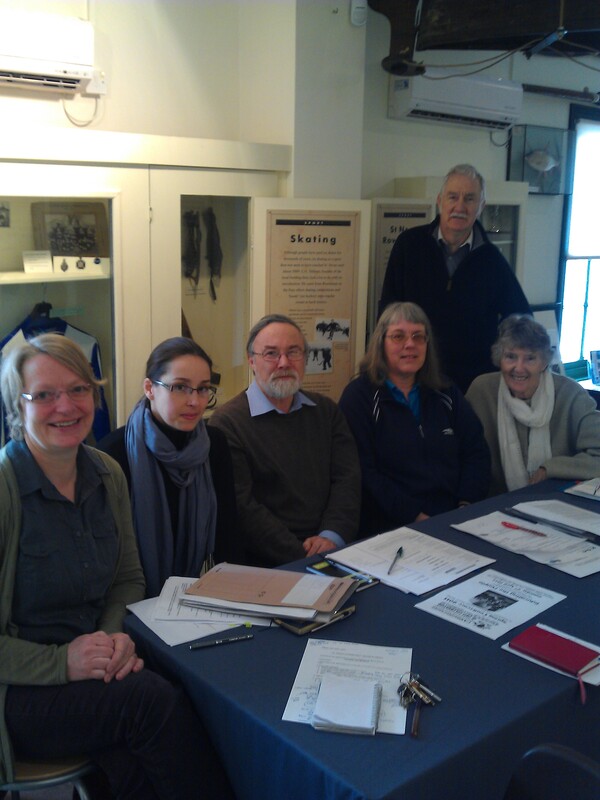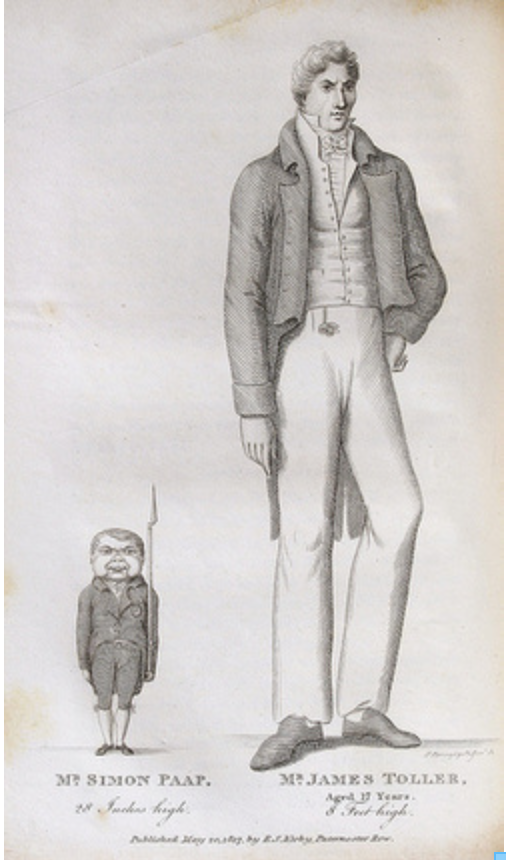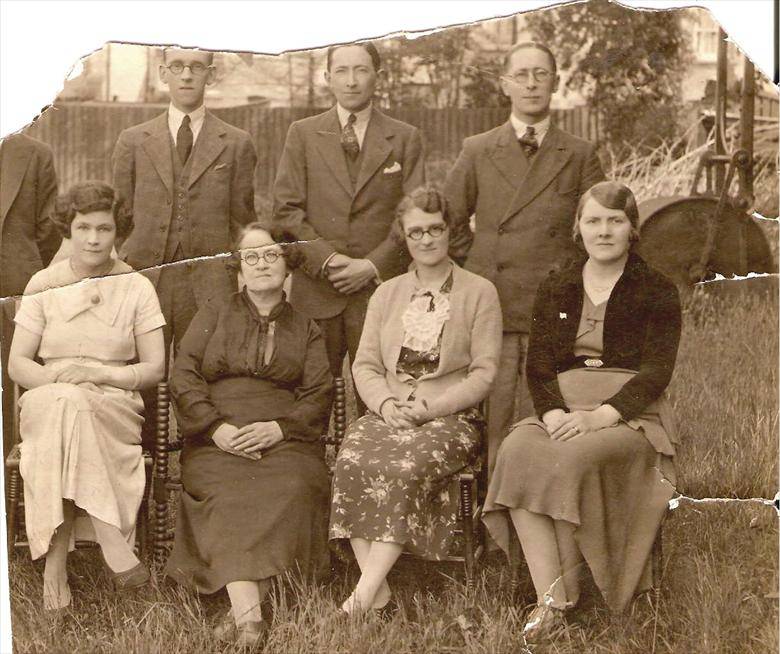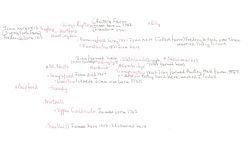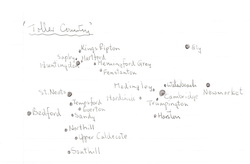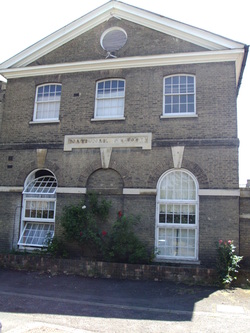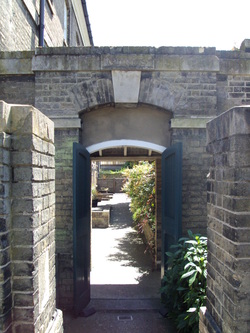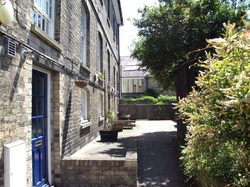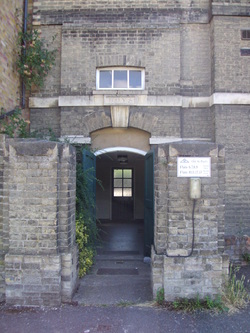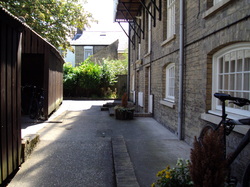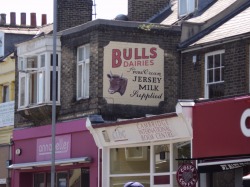|
Cambridge University Press Memories by Elizabeth Toller-Brown, I started work at Cambridge University Press (C.U.P.) in August 1968, in the ‘Assessors’ office; a section of the accounts department. I was just seventeen years old. This was the start of a big adventure for me and it continued for the next three and a half years. During this time, I grew up, had great fun, in so many ways and made more mistakes than I care to mention, but all in all, it was generally a happy time. I left before big changes took place there and I am glad I did! I had enjoyed some of the best years C.U.P. had to offer. In my time there, I worked just a few offices from my beloved father, Eddie Toller. He had worked at the old C.U.P. building, in Trumpington Street, from the age of fifteen and had worked his way up to become one of the managers and ‘Production Liaison Officer.’ In my father’s previous office, in the front corner of the second floor of the old Pitt Building, he had a huge wooden desk; full of interesting things like putty rubbers, that a child like me could squeeze and squash and a swivel chair, which I could spin around on, when I went into ‘town’ and called in to see Dad. Across the road from this lovely old building was a hairdresser’s shop; Reid’s. One day, for fun, the employees lifted the cover off the man hole in the path and kept popping a hairdresser’s dummy head out, much to the surprise of passers by! This was one of the amusing tales Dad told us, when he cycled home, had his dinner (including a dessert), a lie down on the bed and then cycled several miles back to work! We lived in Netherhall Way and I don’t know how he did this, but he was very fit! He had done the same when we lived in Oxford Road, until 1954. It was much easier for Dad to cycle to and from work when the new building opened in Shaftesbury Road, in 1962. I had not been able to take the eleven plus exam, as I was in hospital at the time (another story!) and I felt cheated, as they had said I was “university material” and going to college had been my childhood dream. From my later years at secondary school, I determined to work at the new ‘Press’ with my father and my brother-in-law, Mick Brown. Several of my mother’s Hatchman cousins also worked there, but at that time, I did not know them. When I eventually got a job at the Press, after doing two other mundane jobs, to pass the time of waiting, I found that my office was on the second floor, near my Dad’s. I was to be surrounded by a number of other ladies, mostly around my own age and our poor male boss, Jack Whybrow, had his desk at the back of our office. What goings on he had to endure each day! He was such a quiet, gentle man, nearing retiring age. All of the offices and workrooms were built around a square of gardens, with other workrooms leading off on one side. This meant that we could look out of our office window and see people across the way; great fun for them and us; we fun-loving, giggly girls! One day, I was about to go on one of my walk-arounds, to take papers to other work departments like ‘Compositors’, ‘Readers’, ‘University’, etc. when my friend, Tina Leland, put her black cardigan over her head and a white band across her forehead and sat in my chair near the window, telling me to tell those in the opposite room that we now had a nun working in ‘Assessors’ and of course, they then looked up to see if they could see her! Tina sat there singing ‘Ave Maria’ and saying she was ‘Mother Inferior’! That was just one fun time I remember. We were paid on the 28th of each month and my friend, Carol Hurst, and I would go to town in the lunchtime, on pay day, get some cash out and go shopping in the ‘Alley’ boutique in Falcon Yard, to ‘Primavera’ gift shop on King’s Parade and on the market. I sometimes bought gifts for my Mum and maybe pear drops or sherbet wafer rounds for my Dad, which he enjoyed eating from his desk drawer. Of course, we also bought L.P. (long-playing) records, too. The other lunch-times were usually spent in the large staff canteen, eating cheese rolls, or we might go for a walk to nearby Finches Walk or somewhere local. On Friday evenings, Carol and I would go to the Press discos in the Pavilion, which was then a very small building in the grounds. The disco was run by three of the apprentices, whose work I mainly dealt with; Barry Reynolds, Graham Cherry and Roy Fabb. It was, of course, called the R.C.F. Disco! ‘My’ apprentices included Barry Reynolds, Roy Randall, Graham Cherry, Roy Fabb, David Pearson, Alan Pell-Coggins, Graham Pegg, Noel Woodgate and Roger Thwaites. I also had to assess how long jobs would take for those in ‘Comps’ (Compositors), ‘University’ and ‘Journals’ departments. The men often tried to get me to give them longer time to do jobs, so that they could get more bonus minutes! I enjoyed working out the times for jobs and I could spot mistakes on proofs easily. Carol and I loved these wonderful times. We dressed in the latest fashions and wore quite a bit of make-up, which we took great care applying! We loved dancing at the discos and were pleased when reggae and bubblegum music came along, enjoying these, as well as the usual soul and pop music. In those days of the late sixties to early seventies, bands were always called ‘groups’ and bands were a larger company, playing ballroom, jazz, classical music, or whatever Another use for the Pavilion was as a rehearsal room for the C.U.P. Singers. I had a small group of my own among this group of people, called ‘The Press Gang.’ As a larger group, we sang songs from the musicals, a medley of London songs and many others and my little group sang things like ‘Morningtown Ride’, ‘Michael Rowed The Boat Ashore’ and other folksy songs. I played a 12-string and other electric guitars, which I frequently changed at Ken Stevens, in Petty Cury! We did many gigs all around Cambridgeshire and nearby Suffolk. In my office, among others who came and went, were: Carol Hurst, Gill Hurst, Julie King, Tina Leland, Teresa Georgi, Boosha something, Iris Squires (a lovely older lady), Helen Sweet, Yvonne Pope, Margaret, (who later married ‘Pressite’ Dave Allen), Janet Ayers, Paula McKnight. In Dad’s outer office were Mick Brown, Brian Allen, Tony Littlechild, Colin Walsh, Carmen Raghaven. I knew everyone at the Press and I loved my job and work colleagues. I think it’s sad that all girls do not enjoy that camaraderie with work colleagues and the chance to enjoy the dances, discos and parties that were connected with work, in those golden days; along with the socialising and fun experiences galore, including swimming together at Parkside, which went well until my bikini top came undone in the pool once and the Compositors manager, Gerry Haslop, told everyone about it the next day! All Press employees were photographed by one of the ‘Readers’ named John Bowman; a quiet, reserved person usually, but a keen photographer. Ah, happy days! Elizabeth Toller-Brown. April 2021
0 Comments
2011 Diaries
I had a nice time visiting the very active St Neots Community Archives Group the other week. This is a great CCAN group, very busy and full of ideas and upcoming projects. The St Neots CCAN group includes adjoining parishes such as Yelling, Eaton Socon, Wyboston, Staploe and Paxton to name but a few. The group met for their meeting in the St Neots Musuem which is well worth a visit if you are ever that way. I am particularly fond of this museum as it is home to a life size wall chart depicting my relative, James Toller, The Eynesbury Giant. St. Neots Community Archive has been set up to collect information about the past from the above-mentioned parishes and the surrounding villages. If you have any pictures, old maps or interesting stories that you would like to be included in the St. Neots Community Archive, please contact Pam Ostler at St. Neots Museum or Sue Jarrett at [email protected] If you would like further details of how to have your own CCAN site then please get in touch. c.1935 - Back garden of Oxford Road, Cambridge. Bottom left to right - Connie Toller (nee Broom), Ada Hatchman (prev. Broom/Cruden), Marie Cruden, Violet Cruden. Top left to right - half seen probably Bill, Ed Toller, George Cruden, Arthur Cruden.
My granny (Connie Toller - nee Broom) talking about when she worked at Chivers Fruit farmers and Pye Radio in Cambridge c.1933
My granny (Connie Toller - nee Broom) talking about her first school in Russell Street, Cambridge c.1918 onwards - recorded in 2010
My granny (Connie Toller) talking about the house she lived in when she was very little(c.1915-1920's), on Russell Street, Cambridge.
My granny (Connie Toller) talking about her mum (Ada Broom) working in The Globe Pub on Hills Road Cambridge c.1915
This is my Granny (Connie Toller - nee Broom) talking about when she was little and lived down Russell Street in Cambridge. This is her tale of her brother Russ Broom and the balloon - this little incident would have taken place about 1919
These letters belong to my aunt Joan Punter ( nee Toller ). These contain interesting home front information and political views of the war. They were written by my Great Aunt Marie to her husband George Cruden. ( both now deceased. )
In several of these letter Marie refers to George as Peter Precious- as she was a Catholic from Ireland and didn't want to introduce him to her family as George ( the English kings name ) she called him Peter. At 95: [ Oxford Road Cambridge ] My Dearest x Thanks for your letter, & it was certainly a gruelling journey- pity they don’t put more corridors on- what a life at London Road- that’s some billet- guess the sooner they decide about some other places the better for all concerned- as the a.m. people must be getting fed up with it too. They say on the wireless that they’ve got so many airforce personnel they are drafting them into the other two forces- particularly the army- as that is where they are wanted, seems such a daft arrangement, although they add they are continuing to take recruits. Do you think bringing up the matter of remuster has brought about the recent change about for you & those other chaps? Went to the pictures by myself on Monday night- mother dosen’t care for pictures she says- Monday 6 p.m. I did the front garden by cutting the grass, clearing the beds of toffee papers, rags & other odds & ends, & mowed the back lawn- but I’m scratched to bits for overlooking the rose trees, & plonking into the taller ones. The weather keeps nice, that’s one thing in it all. Yesterday we went to the Botanical gardens. Con & the children. They enjoyed it…can’t seem to think of anywhere nice to go except to Frenches & Brittans..It would have been nice by the sea this weather, wouldn’t it? Uncle Harry turned up at teatime last night- he does look so thin & ill- but he says he couldn’t stand life in that Linton institution any longer & has come back to the lodging house here- I got that tea tin open & passed it on to mother- its best to do that think, don’t you- Well dear, did your washing yesterday ( what a pile ) & hung it out, if she doesn’t do it on me , I’ll iron it. Well cheerio, love. Hope you are feeling better & looking forward to seeing you x Your own loving Marie xxxx p.s. Had a warning Monday night. These letters belong to my aunt Joan Punter ( nee Toller ). These contain interesting home front information and political views of the war. They were written by my Great Aunt Marie to her husband George Cruden. ( both now deceased. )
In several of these letter Marie refers to George as Peter Precious- as she was a Catholic from Ireland and didn't want to introduce him to her family as George ( the English kings name ) she called him Peter. Boxing Day [ Oxford Road, Cambridge ] My Own Dearest & Best x Well, here we are — another Xmas passed & we have had a most happy day but one & all were sorry that you were not with us- & of course theres no need to add what I felt & for you to say what you felt- but the fact was that we all had our drinks at 1.30 sharp- in the middle of cutting up the turkey & we one & all drank to you first & we hope that you were able to get a quite minute to do the same with us. We had plenty of drink & the turkey was just lovely. 15lbs. & the plum pudding mum was delighted with the rum you sent. Thanks were so for your Xmas card darling, it was lovely. By the way we had a large size egg flip & guzzled the lot in 2 sittings you boy. Con [ Georges sister, Connie Toller -nee Broom ] had her Xmas tree & it was larger that she has had other years, but the trouble was to get stuff to put on it anyway we didn’t do so bad. Your number was 6 & mine 10. I got a little old parcel tied up with a bootlace, no bigger than a finger nail- & caused some shrieks by its very size anyway, I opened it & what? A blinkin’ penny & two back studs!! Well I couldn’t resist seeing what you had & found three toffees & 2 cigs. Bill [ George’s brother] got a beautiful pink cushion cover, Ivy a brooch, Con some stocking mending silk, others got some bars of chocolate. Con had some candles on the tree & we outed the light & lit it up & Val [ Con’s daughter ] gave us the prizes she was terribly thrilled with that while we all sat round eyes & mouths wide open in anticipation we then played Newmarket & Brown Anchor & Con won 10/- after 2 hrs play. Then we had some music & my heavens what a row!! We just took it out of the piano me- but old Ivy & Russ had a few drinks & were a proper couple of coons- I laughed ( with the rest of course )- till I felt really sappy but you’d have laughed “fit to kill” if you’d have heard ‘em anyway, we turned in at 2o/c am. I got that song called “Yours” so we have had our bobsworth out of that already. Well, darling x have just had a Guiness & wished you everything of the best & only wishing with all my heart you were with us. X Have you been busy helping the other blokes to drinks? Did you have a party after all? Its bitterly cold today but we are warm & comfortable & my word thanks to mother, you wouldn’t think there was a war on. But theres simply no drink to be brought. Well sweetheart, its now dinnertime, good old roast beef of old England & horseradish! Lovely! Well cheerio sweetheart this is just to let you see I’m thinking of you in spite of all this pleasure & noise. Russell [George’s brother - Russ Broom] is not going back until Sunday, so if you get this in time you will know he is not about until then. I shall D.V. be going back on that 5.15…. Russell didn’t get in until 9.30 when he left you, so you see how late trains are. Well, cheerio sweetheart all love xxxx love & always xxx Marie xxx These letters were given to me by my aunt Joan Punter ( nee Toller ) she now owns these letters which were written by her grandmother- my great grandmother- Ada Hatchman (formally Broom/Cruden), Living in Oxford Road, Cambridge.
95 Oxford Road Cambridge June 20th - 1940 My Dear George and Marie Thankyou for letters, trust you are both well and had a good holiday. You will no doubt be coming back sat. if you come to Cambridge for week end. We shall be pleased to see you both. Eddie [Alexander Edmund Toller] has only just got your letter, he is staying at 7356452 P.. E Toller C/o Mr F Bowling 30 Sandhill Oval Mo.o..stown Leeds we had a very terrible experience Tuesday night- 9 killed 14 injured our window nearly shook out and houses fell to the grounds St Mathews Church Vicarage Terrace, East Road way. your loving mother love to all. As written by my aunt Val Burroughs ( nee Toller ) March 2005.
Outings During the war we didn't go away for holidays. We used to walk from Oxford Road [Cambridge] to the 'Backs' - the backs of the collages, sometimes pushing our dolls' prams. We would enjoy the crocuses, daisies, lingcups etc. Occasionally when uncles were home on leave we would go as a family. When Uncle George was home, he and Auntie Marie would take us to the Botanical Gardens in Bateman Street. My mother and my granny used to take us to the Folk Museum, one of our favorite places. We would admire the wax dolls in their dolls' prams especially. ( Enid Porter, the curator was a friend of my Auntie Marie [Cruden] in later years though, as far as I know ) We used to climb Castle Hill opposite the Folk Museum. Val Burroughs. As written by my aunt Val Burroughs ( nee Toller ) March 2005.
School When I was 4 years old I started at Richmond Road school [Cambridge]. The building was partly a school- partly a church, St Augustines. Sliding doors concealed the church part and the stacks of chairs. Miss Chandler was the dearly loved and respected Headmistress; Miss North was the Infant teacher. They ran the school between them, helped by a monitress, young teen-age girls and the lady cleaner, care-taker and general assistant Mrs Mansfield. When we arrived in the morning, Mrs Mansfield would help you hang up your coat; she always seemed to be avalible to wash hands or knees, to deal with grazes, fasten shoes and cheer you on with her cheerful smile or grin. She wore a cross-over apron and I think had a few missing teeth that was obvious when she grinned at you. I remember her holding up the school pet rabbit, by its ears, unfortunately, as climax of a poem we recited at the concert, " There once was a rabbit, developed the habit of twitching its nose". At Christmas one year each child was asked to take a toy to contribute to a collection that was set out on the 'stage' a small platform at one end of the infant room. Then one, by one, Miss Chandler sent us to go and choose a different toy to keep for ourselves. I was too shy to search for one I really fancied, I grabbed the nearest item, a worn tennis ball and took it home. I remember my mother saying " You've got balls already, why didn't you choose something nice?" On May Day, we would celebrate in Mrs Golding's garden which was at the corner of West Road on Huntingdon Road. A cripple girl in my class was the May Queen. We all wore pretty clothes and bonnets and danced around the Maypole, sang songs like " Oh dear little buttercup, sweet little buttercup, bloom round the throne of our queen." We carried flowers and decorated the throne. Sometimes we would go to play in the hay in Miss Salters land at the corner bend in Storey's Way. Miss Chandler would lead us all in a crocodile down to Mrs Salters. I remember our parents taking us home after an event at Mrs Salters and, one boy messed his trousers on the walk back. a soldier dad in uniform helped him out by wiping his legs with long grass plucked from the road-side! Val Burroughs As written by my aunt Val Burroughs ( nee Toller ) March 2005.
Toys, Games and Occupations. As my mother was into toys herself, she would be on the look out for any toy that she could obtain second-hand. She was delighted with a pedal-car she found in a second-hand shop in Bridge Street [Cambridge] and we would visit Shrives the toy shop near Christ's Lane and Eaden Lilly's basement toy shop. I remember going with my mother to an art shop in Trinity Street and buying watercolours in the four primary colours. Coloured pencils were restricted to those four colours. After the war I remember being just thrilled to have a wider range of colours. A girl in my class at Cambridge High School for Girls arrived at school with a packet of about a dozen coloured pencils and we all clamored around her asking where she'd obtained them. She told us a shop in Newmarket ( Woolworths I think ). Then Derwent pencils came out in Heffers and my friends and I used to go there each Saturday to choose another colour to add to our collection at 9 pence per pencil, which was quite expensive. My mother used to take us to a shop at the corner of Bermuda Terrace to buy colouring books or magic painting books. My uncles used to make me toys like dolls houses, monkeys or clown acrobats that swung between two sticks you had to squeeze; a balancing parrot. We used to spend our time on the allotments- so many of my memories are of playing there and on the local Rec. in Richmond Road, where there were swings, a long rocking horse with a row of seats behind the horse's head and a really long swing with handles all along for several seated children- an older child would stand each end to keep the swing momentum going. Miss. Chandler used to take us onto the rec' sometimes towards the end of the school day. Then we would gather by a tree for the final afternoon prayer before being collected by our parents. Mum went to Belfast for three weeks holiday to spend time with dad who was a Sergeant in the Army. When she came home she brought a baby doll for my sister and a white fur dog with lead weighted feet. My auntie used to knit dolls clothes for us.We decorated twigs with sealing wax-"blossom". When my dad was due to come home on leave I remember drawing a picture of him in his uniform using the 'khaki' chalk. When I'd been to the dentist in Newnham, mum took me to the toy shop there and brought me an orange pop-gun. The same shop sold us a toy sewing machine on another occasion. It did chain-stitch. I remember tracing outline pictures from the newspaper using toilet paper as tracing paper as it was smooth, shiny and transparent. Val Burroughs ( nee Toller ) As written by my aunt Val Burroughs ( nee Toller ) March 2005.
Food and Clothing My uncle Bill had allotments where he kept pigs and poultry ( chickens and turkeys ). We therefore had veg and eggs. Chickens was a treat. Sometimes Uncle Bill would kill a hen that had stopped laying and it was cooked in a saucepan as a "broiler". We brought rationed fish from the MacFisheries and rationed meat from Roses the butcher in Petty Cury [Cambridge]. At Richmond Road School, I was one of the children who was selected to recive cod liver oil of malt, administered daily by the spoonful to each child as we queued. A crateful of small bottles of milk stood warming in the hearth in Miss Chandlers classroom. At the end of the war we relished the idea of fruits we hadn't had before, like bananas. At our Victory party in Richmond Road we were given ice-cream for the first time, although a neighbour who worked in a hotel did used to bring home small bars of yellow 'ice cream'. A neighbour, Mrs Kidman, used to spend some of her sweet coupons on me and would give me turkish delight. At the end of the war, the first influx of sweets included 'wrapped soft-centered fruit sweets from Poland-an inch and a half long with pictures of fruits on the paper wrappers. At Easter my mother would make me an Easter egg. She would melt chocolate and pour it into two bakelite egg cups. I remember sitting by the radio, watching these set, placed in front of the radio. They would be stuck together when set. We would go to the clinic at the Methodist Church on Castle Street where we recived concentrated orange juice that you would mix with water. Clothing rationing, combined with low income meant that families were glad of second hand and refashioned garments and bedding. We were thrilled when the Red Cross gave my sister and me a cardigan each because our father was a solider, ( my mother recived a bedspread ). Our wardrobes were never full like they are now. Our blankets had to do for several years and would be passed from one generation to the next. Some of them were thin with no fluff left and often bore the utility mark. Overcoats would be piled on top of bedding to add extra warmth. Coal was rationed. We would awake to frosty fern patterns on the inside of the bedroom windows. When I was confined to the front bedroom for weeks with Scarlet Fever, I remember Miss Chandler bringing some of my class-mates to wave to me from the other side of the road. Mrs Fletcher, the milkmans wife, gave me some jelly- an unobtainable treat! All scraps of food like vegtable peelings were collected in the pigswill bins that were found at intervals along the kerb-side, ours was next to the telegraph pole outside 112 Oxford Road. As Uncle Bill kept his own pigs and chickens, scraps also went to them. I remember the smell of potato peelings boiling on the gas cooker and then they would be mashed into chicken food that looked and smelled like bran. My auntie would carry it to the allotments each afternoon in buckets. A well provided water and I warned to stay away from it. Horses and carts delivered milk, vegtables etc. The milk came in bottles with cardboard tops. If you pressed out the centre you had a ring on which to wind wool to make a pom-pom to decorate clothes or to play with. I remember watching the greengrocers horse eating from its nose-bag outside our house and then tossing its head to reach the remains at the bottom of the bag. Val Burroughs ( nee Toller ) As written by my aunt Val Burroughs, March 2005.
Living with the horrors of war Very early on in the war my father [Ed Toller] nearly lost his life. He was running across the battlefield with German planes overhead. Apparantly he could see a pilot shaking his fist. He dropped his mouth-organ and his prayer book, but, prayed "Lord, let me get home to my wife and children." He did. I remember my mother [Connie Toller] and auntie watching the distant sky to the south of my back bedroom window. My auntie was crying as she dreaded the bombs were hitting Linton ( her home village ) as the sky was lit up in that direction. During night-time air raids the wardens would tell my mother to get inside my granny's house as she would look out of the front door to look out for planes. During day time raids, I remember my gran and mum heaping furniture as a shelter over me e.g. the settee tipped back to reach the piano with me underneath. At night we sometimes slept under the " shelter table" a heavy duty metal table in the living room, with caged sides. Sometimes we would shelter in the cuboard under the stairs where my toys were kept, I don't recall being frightened. One day my mother was taking us out for a walk, pushing the pram along Madingly Road, when a truck driver asked her the way to the American cemetery, he told us he had a "load of guys on board." One of my friends, who lived at the back of our house, in Richmond Road, Eileen, lost her father when he became ill with beriberi through deficiencies in his diet out in a foreign country where he was in active service. Uncle Bill was in the fire service, so was in the front line when it came to dealing withbombing raids. Once, when driving fast he was convicted of speeding! Even fire engines had restrictions put upon them. Of course, it was damaging to family life to have husbands and fathers away for six years. We hardly knew our fathers when they came back. I remember my mother cleaning and polishing the house and making herself look pretty when my father was coming home on leave. Then when his leave came to an end, there was always the sadness of parting. I would stand at the door with my nanna, my fathers mother, and watch mum and dad walk up Oxford Road. We never knew if he would return, of course. The telegraph boy, on his motorbike, was an unwelcome visitor to our road. He might be delivering a telegram of congratulation or good wishes, on the other hand, he might be on a sinister errand with the news that a loved one had died in active service. I remember the day men arrived to remove our house railings from the front garden. I watched them at their devastating work of taking every bit of iron to build tanks or amunition. Those railings were never replaced. Val Burroughs ( nee Toller ) Written by my aunt Joan Punter ( nee Toller )whilst attending Miss Winnie Chandler's infant school, Richmond Road Cambridge. c.1940's
Do you remember a red roofed school A handful of shell for your sums? They gave you a Mickey Mouse gas mask And a pack of American gum. Do you recall when your dad was on leave, Dancing around like Astair? They dressed you up like Shirly Temple With a big ribbon bow in your hair. At night sleeping under the table While bombers droned over your heads, And granny said "Won't it be lovely, when we can sleep safe in our beds", One day they said " The War's over!" Grannie sang of the Alley and 'Sal'. When Vera sang 'White Cliffs of Dover' And the bells rang 'for me and my gal'. Joan Toller Toller Family Tree notes by Joan Punter [nee Toller] (my aunt – transcribed by Michelle Bullivant Dec 2010)
John (1727-1807) probably born at Everton, grew up and married Elizabeth. They moved to Upper Caldecote around 1759, to Tempsford in 1779, died and was buried in Tempsford in 1807. James (1762- 1826) born in Upper Caldecote, married Mary Swanell in 1786, took over the farm at U.C., moved to Kings Ripton in 1788, and farmed Rectory Fram. Moved to Southill, farmed Old Rowney 1803-26, and was buried there. John (1791-1872) born at Kings Ripton, married Anna Maria Swanell in 1811, farmed Recotory Farm for his father , until 1813, moved to Sapley (Sapley Park Farm) in 1831, farmed at Fenstanton in 1851 at Tollers Farm in Hemingford Grey, at Anstey Hall Farm in Trumpington in 1842, also Moor Barns farm in Madingley, later bought s…Farm at Streatley, also land at Dunstable. In 1871 John came back to Anstey Hall, and is buried in Trumpington Church. He seems to have been the most successful and rich farmer. Frederick Swanell – born in 1813 at Sapley Park Farm – farmed his fathers land at Fenstanton in 1840. He married the ‘house-keeper’, Betsy Brown, an Irish woman, in 1852. They farmed at Hemingford Grey until the lease expired, when his father refused to sign it so that he lost his livelihood. Cut off by his father he worked as a bailiff in Hardwick until 1860. Then moved to Cambridge (67, Newmarket Road) where 5 of their seven children died in overcrowded, unsanitary housing, so different to the healthy life in the country they were used to. Frederick died of TB in 1874. Betsy moved to Harston and married Josiah Pestell, who ran a bootmakers shop. Richard 1864-1937, born in Newmarket Road, and moved with his mother to Harston at 10 years old. He came back to Cambridge (1892) where he met his second wife, Florence Clifton, married and lived at 29 Perowne Street, Mill Road. He died there in 1936. He spent his later life as a painter and decorator. Alexander Edmund (Ed, Eddie) 1915-1987 born at Perowne Street, his only sibling, sister Peggy , died of pheumonia aged 5. Eddie worked at Cambridge University Press in Trumpington Street from the age of 15. He married Constance Beatric Broom in 1934, they had four children and he served in the Royal Army Medical Corps 1939-45, fought in France, retired at 65. They lived at 110 Oxford Road until 1954, when they moved to 59 Netherhall Way. Eddie died of cancer of pancreas aged 69. Elsie Joan born 1940, during World War II at Oxford Road. Attended Richmond Road Infants School, then Park Street Primary School. Went to Cambs High School for Girls in 1951, left in 1956 and went to work at University of Cambridge Exams Syndicate, Mill Lane (opposite C.U.P., where her father worked). Joan married Michael Euyene Brown in 1959, and lived at 10 Church Street Chesterton. She had Christopher david, then moved to 116 Fishers Lane Cherry Hinton, where she had Jacqueline Susan. They moved to 57 Glebe Road, and she had Andrew Paul. In 1976 they moved to 15 Shaftesbury Road near the University Press buildings. After the break-up of her marriage Joan married Richard Douglas Punter and they lived at 7 Drayton Road [Cherry Hinton] where she had Mia Jane in 1979 and Eleanor Claire in 1983. Written by Joan Punter (nee Toller) – my aunt – transcribed by Michelle Bullivant Dec 2010
PART ONE: When I was born on 16th April 1940 my father, Eddie, was away in the War. He came home on leave from time to time but I didn’t really have time to get to know him and I apparently got really cross if he and mum danced to the radio together, or kissed and cuddled. We had Russ and Ivy [Russ Broom & his wife – Joan’s uncle, my great uncle] living with us at 100, Oxford Road, so Val [Joan’s sister, my aunt] and I had a lot of attention, games played with them, books read to us and plenty of fun in spite of hours spent under the metal air-raid table, in the cupboard under the stairs (taking turns to sit on the gas meter of all places), and under the piano across the road at No.95. No.95 [Oxford Road] was of great importance in our childhood. Gran, [Ada Broom, formerly Cruden, nee Hatchman, my great grandmother] was there, cooking wonderful old fashioned meals, cakes and pies as did all of her generation. She had also been a kitchen maid, then cook, in service in London as a young woman. It was there she had met her first husband, Cruden. They had George, Arthur and Elsie, then when her husband died of pneumonia in his 30’s, she had to come back to Cambridge where she had support from her mother and sisters, especially Laura and Phoebe. Things were tough and she was very poor. Finally her milkman [Arthur Broom], giving her extra milk and butter for the children, courted her and they married. They had William Hardwick (Bill Broom) in Hardwick Street, then Russell in Russell Street, followed by my mother [my granny] Constance Beatrice. Ada was never one to live a quite life, and she always worked when she could fit it in with her children. I think what caused the most upheaval in the marriage was where she worked at the Globe [pub], Hills Road and started socialising, leaving Arthur minding the children (remember they were not his, and the other three were still very young). There is a true story, told to us by Ada’s sister, Ethel, that one evening when she called at the house, Ada was late coming back from the pub. When she eventually turned up my grandfather said “See, she told me one hour, and it has been three”. With that Ada hit him over the head with a bottle of beer! My grandmother was all heart. She would give her last shilling to a tramp in the street and she loved her children and grandchildren with a deep and protective love; but she had a temper that sometimes frightened people to death. She had had a very hard life and had no time for anyone who was lazy or useless. The stormy marriage ended when our mother [my granny] was 3, so she never had a father figure after that, apart from older brothers of course. The one blessing, I think, that all of my mother’s family had was closeness and support for one another. Ada was always outspoken, even critical, to everyone, though, our mother had to make sure the house was clean when Gran popped over as she might say “What’s that stink in here? You will get the fever!” if something smelly had been left in the kitchen. She had suffered Typhoid Fever and Rheumatic Fever when a young woman so she was very health conscious. Mum remembers, when they lived up Russell Street, if any of them had an accident, Gran would say “Quick, up the “orspidal”, as fast as your legs will carry you!” As Addenbrookes was in Trumpington Street then, it wasn’t far to run. Gran had worked for Turner the magistrate (who officiated at her divorce from ‘Broomy’ as they affectionately labelled him) so on the break up of her marriage Mr. Turner kindly housed them at no.95 Oxford Road “for as long as she lived”! (On her death the house was bought (very reduced in price) by Bill.) So at last, when I was five and starting Richmond Road Infants School, the war ended and my father came home a hero, with his medals and stick with the silver knob on top. We used to play with gas masks on our faces, pretending we were Mickey Mouse, now that they had no use for gas attacks. I don’t want to just record facts and dates in this essay but I would prefer to write a piece with the portrayal of the memories and atmosphere about this time. I sometimes drive down Oxford Road, Windsor and Richmond Roads. I immediately feel the security of the happy years of my childhood. Our house at 110 [Oxford Road] , called ‘Fredaville’, was a usual bay-windowed one, with the ‘front room’ kept tidy and the best furniture in it. We sat there in the sunshine and never messed it up. Our play area was the ‘back room’. It had no bright sunlight streaming in the windows; old chairs, brown worn lino on the floor, and a big old radio by the window in a cupboard. This was our only means of keeping in touch with news, music and comedy and I remember the feeling of dread shown by the grown-ups listening for news on how the war was going. We could be taken over, (with the rest of the world) by the evil dictator, Hitler, our fathers killed , our houses bombed and all of us blown to pieces. However the spirit of our people was always victorious; our father, with his men, would destroy the Nazis forever and we would be safe. Mum was terrified, though, of the planes going over nightly, and the doodlebugs droning over, then exploding. She would drag us shaking, in the stairs cupboard, pitch-black everywhere of course in the black-out, or over to 95 [Oxford Road], making us a fortress under furniture while Gran made cups of tea. You would think Val and I would grow up afraid to leave the house, but it seems to have done us no harm in the long run, for we are both outgoing and confident mothers; so perhaps all our fears were finally put to rest with the jubilation of victory celebrations and seeing our menfolk return, marching proudly and in step along the streets of Cambridge, Union Jacks flying like mad from every house. We seemed to always have a little flag to wave in those happy days. Daddy put away his big kit-bag for good, with his khaki uniform and sergeants badges; Uncle George [Cruden] would no longer be seen in the air force blue uniform, nor Uncle Bill in his firemans one. Everyone was now in ‘civvy street’ and Bill was a grocer again, George was in Mackintosh’s shop in town and our daddy went off every morning on his bike to the Cambridge University Press as a clerk. We now had a baby brother, David, to add to the excitement too, so mummy was always happy and busy, the frequent visits across to Gran’s were now peaceful and jolly, laughter, singing and drinking by the adults at weekends, when Charlie from the Dolamore’s Role on his three-wheeled cycle, puffing and blowing up Castle Hill to bring bottles of booze and lemonade clinking in the enormous metal basket on the front, poor man! We became good friends with Edgar Fletcher, the milkman and his daughter. She always seemed to have interesting pets. He had glass tanks in the garden containing butterflies, I think, also snakes. His daughter told us to come over and see her new baby golden bears. They were actually hamsters, but we had never seen any before, nobody had. Part 2 to follow........ This is the school that my grandmother (Connie Toller - nee Broom) went to as a child, with her older brother Russ Broom. It has now been converted into flats but there is a small modern school next door.
*Please note that this clip has temporarily been removed for re-formatting and will be added back shortly. Thank you for your patience. This is a short clip of me chatting to my granny, Connie Toller (nee Broom) about where she grew up in Cambridge. Granny is 95 now (2010); she spent the first part of her childhood growing up down Russell Street in Cambridge. In this clip she talks about the cows that used to come off of Coe Fen and down Russell Street to the corner where it joined with Hills Road, where there was a dairy. She also talks about the old cattle market which used to be at the corner of Hills Road and Cherry Hinton Road in Cambridge. The old cattle market has now gone and in its place today stands the Cambridge Leisure Park.
|
Cambridgeshire History Pages:
Contents If you'd like to go straight to a specific article or blog post within the Cambridgeshire History Pages you can click on any of the post titles in the list below and it will take you directly there. Alternatively, you can use the search box above to search by keyword or you can use the index further below. Summerfield: House, Street & Area History, Newnham, Cambridge.
Newnham Walls (Newnham, Cambridge) Church Rate Walk/Newnham Walk/Summerfield. Exciting Old Photograph Album History of Lammas Land, Newnham, Cambridge (Newnham Park) Brief History of Jesus Green, Cambridge Motorbike Girls, Oxford Road, Cambridge c.1928 Violet Broom & Marie Cruden Cambridge University Press Memories by Elizabeth Toller-Brown Teversham Recreation Ground Elton Community Archives Group St Neots Community Archives Group Soham Community Archives Group Cottenham Community Archives Group Stapleford Recreation Ground The Beechwoods Cambridge Guilden Morden Cambridge. Teaching & Artefacts Ely Cambridgeshire Community Archives Group Stilton Cambridgeshire Community Archives & History Cottenham Village Society Haddenham & Aldreth Blossoms & Bygones 1940s Event 2011 Wimpole Folly 1963 St Giles Cemetery, Huntingdon Road, Cambridge - grave of Ada Hatchman (nee Broom) 1955 Oxford Road, Cambridge Violet & Arthur Cruden Passport 1931 Cambridge George Cruden, Military Cambridge c.1940s Oxford Road Cambridge Family c.1935 1st Camb. Headquarters. Cambridge 1925 Rowing on the River Cam 1925 George Cruden, Russell Street, Cambridge The Wayman Family, Oxford Road, Cambridge George Cruden, Oxford Road, Cambridge Marie Cruden, sitting in back garden of house in Oxford Road, Cambridge Eaden Lilley of Cambridge adverts for household items c.1920's Cambridgeshire Transport Section ? WWI Cambridgeshire Transport Section WWI Cambridgeshire Transport Section WWI Arthur Cruden Oxford Road, Cambridge WWII? Room in Oxford Road, Cambridge. 1915-1925 Granny working at Chivers Fruit Farm & Pye Radio Cambridge National School, Russell Street, Cambridge c.1918 Russell Street, Cambridge and Pimple Face! The Globe Pub Cambridge and shoe money c.1915 Great Uncle Russ and the Balloon 1919 Lilly Langtree & Cambridge War Time Child in Cambridge. WWII Cadbury's Picnic Bar, Adkins Corner Heffers Cambridge Picnic by the River Cam, Newnham c.1984 Castle Hill, Cambridge 1984 The Half Moon Inn, Trumpington Street, Cambridge A Garden of Memories by George Cruden Cambridge War Time Letters - Oxford Road Cambridge War Time Letters Home Front Christmas WWII Cambridge Home Front War Letters 1945 WWII Home Front WWII Cambridge Family War Letters More Cambridge Home Front Letters - Vicarage Terrace WWII The War in Cambridge WWII Marie & George Cruden, The Backs of Cambridge Colleges 1941 Outings During the War - WWII Cambridge Memories of Richmond Road School in Cambridge Cambridge - WWII - Toys, Games & Occupations WWII - Food & Clothing - Cambridge Living with the Horrors of War - Cambridge WWII A Child's WWII Home Front Poem - Cambridge Toller Family Tree Notes - all over Cambs Home Front Letters. More WWII Bombing in Cambridge 1941 Home Front Letters WWII Bombing in Cambridge 1941 Tales from Cambridge Part 2 by Joan Punter (nee Toller) Tales from Cambridge Streets during and just after WWII Wall in a Tree, The Botanical Gardens, Cambridge, 2010 National School, Russell Street, Cambridge 2010 Clunch (Chalk) blocks in wall behind Hill's Road 2010 Russell Street & Cambridge Cattle Market voice recording oral history Punting on the River Cam, by Paradise Woods, Newnham. 2001 c.1988 - View from the Top of Great St Mary's Tower, Cambridge 1983 - Arthur Cruden, Cambridge City Bowls Club, Christ's Piece, Cambridge 1983 - Cambridge City Bowls Club, Morley Cup. c.1985 Marie Cruden, Campkin Road c.1975 - George & Marie Cruden Golden Wedding Anniversary, Campkin Road, Cambridge c. 1965 Visitor's Passport for Violet & Arthur Cruden, Oxford Road, Cambridge c.1975 George & Marie Cruden outside St John's Church Cambridge c. 1975 George Cruden, rear view of 146 Campkin Road, Arbury, Cambridge 25th Jan 1941 - George Cruden WWII Views from the building site for the Cambridge Grand Arcade, during the archaeological dig 2005 Archaeology Field Trip in the Fens, Stretham Pumping Engine, 2000. The Birds Nest at Chippenham Park Cambridge 1999 The Old Walled Garden Chippenham Park 1999 Violet Cruden - nee Westley, Histon, Cambridge 1928 Pet Show at the Church of the Good Shepherd, Arbury, Cambridge c.1979 George Cruden, Russell Street, Cambridge c.1918 Arthur Cruden, Bill Goodes & friends, Cambridge. 1910 - 1930 George H Cruden age 17 KRRC Cadets, Cambridge 1917 Elsie Cruden, lived at Russell Street Cambridge About & how to use:This is a blog page for the archives in my own collection. It includes many of my personal & family archives, tales and scrapbook items to all kinds of general archive items from Cambridgeshire UK. The Categories below are really the keyword index of what is on the Cambridgeshire History Pages. Each is a clickable link which will take you to an article or blog which contains that word or subject.
Categories
All
|
